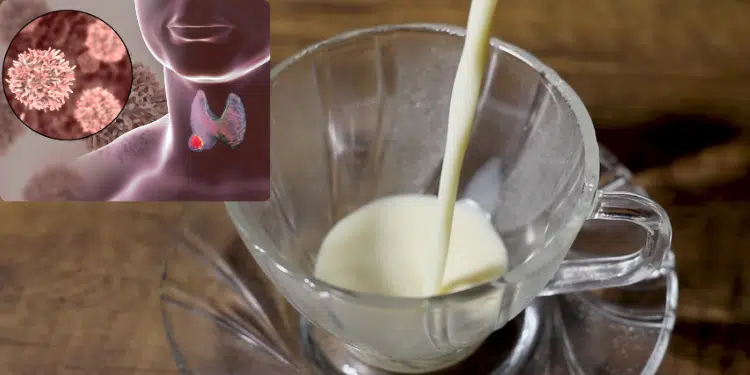Soy products, often marketed as healthy alternatives to dairy and animal-based proteins, have become staples in many diets.
Soy milk, tofu, and soy-based snacks are particularly popular among those looking for plant-based options.
However, mounting research reveals that soy may not be as healthy as it seems, especially when it comes to thyroid health and breast cancer risk.
Here’s what you need to know about the potential dangers of soy and why this so-called “healthy” drink might be harming your body.
How Soy Affects Your Thyroid
The Problem with Soy Isoflavones
Soy contains isoflavones, a type of phytoestrogen that mimics estrogen in the body.
While phytoestrogens have some health benefits, they can interfere with the normal functioning of the thyroid gland.
Impact on Thyroid Health
- Disrupts Iodine Absorption: Soy can inhibit the absorption of iodine, which is essential for thyroid hormone production.
- Suppresses Thyroid Function: Isoflavones may block the activity of thyroid peroxidase, an enzyme crucial for thyroid hormone synthesis.
- Increases Risk of Hypothyroidism: For individuals with existing thyroid issues, soy can exacerbate symptoms like fatigue, weight gain, and cold intolerance.
Scientific Evidence
- A study published in Thyroid Research found that excessive consumption of soy products was linked to thyroid dysfunction, especially in individuals with iodine deficiency.
Soy and Breast Cancer: The Hidden Risk
Phytoestrogens and Hormonal Imbalance
The estrogen-like compounds in soy can mimic or disrupt normal estrogen levels, which plays a significant role in breast cancer development.
Studies Highlight the Connection
- Hormone-Positive Breast Cancer: In women with estrogen-receptor-positive breast cancer, excess soy intake may promote tumor growth due to its estrogenic effects.
- Conflicting Research: While some studies suggest that moderate soy consumption may reduce breast cancer risk, others warn that overconsumption or soy supplements may increase the risk in vulnerable populations.
Who Is Most at Risk?
- Women with a family history of breast cancer.
- Postmenopausal women who are sensitive to hormonal changes.
- Individuals consuming large amounts of processed soy products.
Hidden Sources of Soy
Soy isn’t just found in soy milk or tofu – it’s hiding in many processed foods, often in the form of soy protein isolate or soybean oil. Common sources include:
- Protein bars and shakes.
- Meat substitutes like soy burgers.
- Sauces and dressings.
- Packaged snacks and baked goods.
Safer Alternatives to Soy Products
If you’re concerned about the impact of soy on your thyroid and overall health, consider these plant-based alternatives:
- Almond Milk: A low-calorie, nutrient-rich alternative to soy milk.
- Oat Milk: Creamy and versatile, with no estrogenic compounds.
- Coconut Milk: Great for cooking and adding flavor to recipes.
- Chickpeas and Lentils: Excellent sources of plant-based protein without the hormonal effects.
How to Consume Soy Safely
If you still want to include soy in your diet, moderation and mindful consumption are key:
- Choose Fermented Soy Products: Fermented options like miso, tempeh, and natto have reduced phytoestrogen content and are easier to digest.
- Limit Processed Soy: Avoid highly processed soy products, which often contain added chemicals and preservatives.
- Check Your Iodine Levels: Ensure you’re getting enough iodine through foods like seafood, eggs, and fortified salt.
While soy products are often marketed as a health food, their impact on thyroid health and potential links to breast cancer make them a questionable choice for many people.
By understanding the risks and choosing healthier alternatives, you can protect your hormonal balance and overall well-being.
Share this article with friends and family to spread awareness about the hidden dangers of soy products and the steps they can take for better health!
